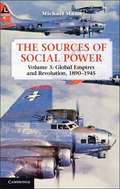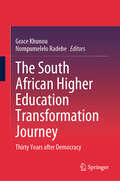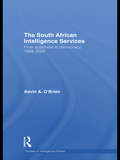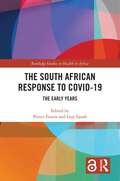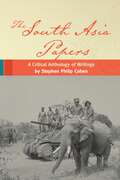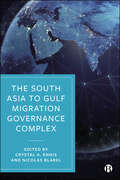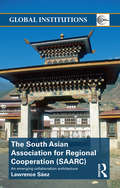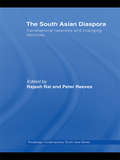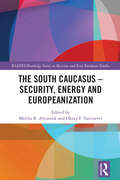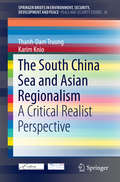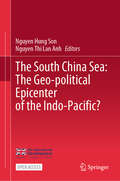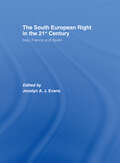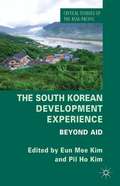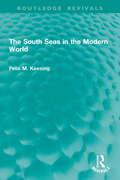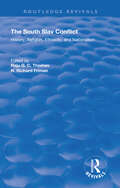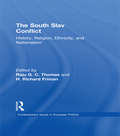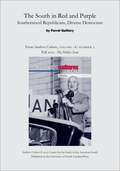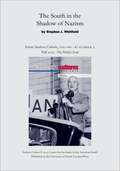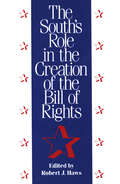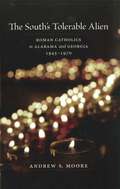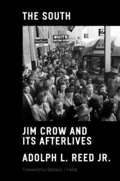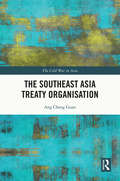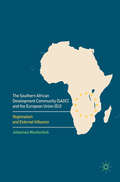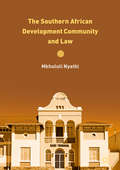- Table View
- List View
The Sources of Social Power
by Michael MannDistinguishing four sources of power – ideological, economic, military and political – this series traces their interrelations throughout human history. This third volume of Michael Mann's analytical history of social power begins with nineteenth-century global empires and continues with a global history of the twentieth century up to 1945. Mann focuses on the interrelated development of capitalism, nation-states and empires. Volume 3 discusses the 'Great Divergence' between the fortunes of the West and the rest of the world; the self-destruction of European and Japanese power in two world wars; the Great Depression; the rise of American and Soviet power; the rivalry between capitalism, socialism and fascism; and the triumph of a reformed and democratic capitalism.
The South African Higher Education Transformation Journey: Thirty Years after Democracy
by Grace Khunou Nompumelelo RadebeThis book explores the transformation of the South African higher education system 30 years after democracy. It examines the progress, tensions, and possibilities through a detailed analysis of how inclusion, curriculum transformation, and epistemological shifts have shaped—and continue to shape—South African higher education. The chapters draw on a range of theoretical frameworks, including decolonization, Africanization, and intersectionality. The book argues that while the South African higher education system has made significant strides in expanding access and fostering critical engagement, the journey toward full transformation remains an ongoing endeavor. The conclusions reached in the book suggest that deep inclusion, meaningful curriculum transformation, and epistemic justice require sustained institutional commitment, policy alignment, and active engagement with students, academics, and society at large.
The South African Intelligence Services: From Apartheid to Democracy, 1948-2005 (Studies in Intelligence)
by Kevin A. O'BrienThis book is the first full history of South African intelligence and provides a detailed examination of the various stages in the evolution of South Africa’s intelligence organizations and structures. Covering the apartheid period of 1948-90, the transition from apartheid to democracy of 1990-94, and the post-apartheid period of new intelligence dispensation from 1994-2005, this book examines not only the apartheid government’s intelligence dispensation and operations, but also those of the African National Congress, and its partner, the South African Communist Party (ANC/SACP) – as well as those of other liberation movements and the ‘independent homelands’ under the apartheid system. Examining the civilian, military and police intelligence structures and operations in all periods, as well as the extraordinarily complicated apartheid government’s security bureaucracy (or 'securocracy') and its structures and units, the book discusses how South Africa’s Cold War ‘position’ influenced its relationships with various other world powers, especially where intelligence co-operation came to bear. It outlines South Africa’s regional relationships and concerns – the foremost being its activities in South-West Africa (Namibia) and its relationship with Rhodesia through 1980. Finally, it examines the various legislative and other governance bases for the existence and operations of South Africa’s intelligence structures – in all periods – and the influences that such activities as the Rivonia Trial (at one end of the history) or the Truth and Reconciliation Commission (at the other end) had on the evolution of these intelligence questions throughout South Africa’s modern history. This book will be of great interest to all students of South African politics, intelligence studies and international politics in general.
The South African Response to COVID-19: The Early Years (Routledge Studies in Health in Africa)
by Pieter Fourie Guy LambThis book analyses the first two years of South Africa’s response to the COVID-19 epidemic, from its emergence in early 2020. Drawing on the perspectives of a range of public health experts, economists and other social scientists, and development practitioners, this book argues that understanding this early response will be essential to moderate and improve future policy thinking around health governance and epidemic readiness. This book provides a systemic analysis of not only the epidemiological progression of COVID-19 in South Africa, but also the socio-political factors that will be key in determining the future of the country as a whole, including health system challenges, socio-economic disparities and inequalities, and variable (often contradictory and tardy) policy responses. Overall, this book exposes Manichean thinking and the spurious policy dichotomies that pitch public health against human rights, economic recovery against viral vector control, and science against ideology, with lessons not just for South Africa, but also for elsewhere on the African continent, and beyond. This book will be perfect for researchers and practitioners across Public Health, Health Policy, and Global Health, as well as those with an interest in South African politics and development more generally. The Open Access version of this book, available at http://www.taylorfrancis.com, has been made available under a Creative Commons Attribution-Non Commercial-No Derivatives (CC-BY-NC-ND) 4.0 license.
The South Asia Papers: A Critical Anthology of Writings by Stephen Philip Cohen
by Stephen P. CohenThis curated collection examines Stephen Philip Cohen's impressive body of work.Stephen Philip Cohen, the Brookings scholar who virtually created the field of South Asian security studies, has curated a unique collection of the most important articles, chapters, and speeches from his fifty-year career. Cohen, often described as the "dean" of U.S. South Asian studies, is a dominant figure in the fields of military history, military sociology, and South Asia's strategic emergence.Cohen introduces this work with a critical look at his past writing-where he was right, where he was wrong. This exceptional collection includes materials that have never appeared in book form, including Cohen's original essays on the region's military history, the transition from British rule to independence, the role of the armed forces in India and Pakistan, the pathologies of India-Pakistan relations, South Asia's growing nuclear arsenal, and America's fitful (and forgetful) regional policy.
The South Asia to Gulf Migration Governance Complex
by Crystal A. Ennis and Nicolas BlarelEPDF and EPUB available Open Access under CC-BY-NC-ND licence. The Gulf is a major global destination for migrant workers, with a majority of these workers coming from South Asia. In this book, a team of international contributors examine the often-overlooked complex governance of this migration corridor. Going beyond state-centric analysis, the contributors present a multi-layered account of the ‘migration governance complex.’ They offer insights not only into the actors involved in the different components of migration governance, but also into the varying ways of interpreting and explaining the meaning and value of these interactions. Together, they enable readers to better understand migration in this important region, while also providing a model for analyzing global migration governance in practice in different parts of the world.
The South Asian Association for Regional Cooperation: An emerging collaboration architecture (Global Institutions)
by Lawrence SaezThe South Asian Association for Regional Cooperation (SAARC) is an international organization comprised of the eight countries in South Asia. This work aims examine the institutional structure, objectives and effectiveness of the SAARC in its role as South Asia’s leading regional institution. Drawing on original research it offers a fresh and accessible account of SAARC, arguing that South Asia forms a unique regional security complex that enables certain forms of regional cooperation and bars cooperation on other issue areas. The text provides a comprehensive introduction to the SAARC, describing the historical developments that lead to its formation and examining key issues such as: The inner workings of Regional Centres and, their success in implementing the decisions reached at SAARC summits. How SAARC has sought to address critical new security challenges, such as health pandemics, terrorism, energy security South Asia’s economic cooperation and the South Asia Free Trade Agreement (SAFTA) Challenges that expansion pose to the organization, particularly China’s suggestion to expand beyond the traditional borders of South Asia The work aims to evaluate what scope there is for formal institutions like SAARC to provide a permanent regional security architecture within which South Asian countries can effectively address important issues, and will be of great interest to all students and scholars of Asian security studies and institutions in general and students and scholars of international relations in South Asia in particular.
The South Asian Diaspora: Transnational networks and changing identities (Routledge Contemporary South Asia Series #Vol. 11)
by Rajesh Rai Peter ReevesThe South Asian Diaspora numbers just under 30 million people worldwide, and it is recognized as the most widely dispersed diaspora. It is, moreover, one which of late has seen phenomenal growth, both due to natural increase and the result of a continued movement of professionals and labourers in the late 20th and early 21st century from the subcontinent to countries such as the United States, the United Kingdom, Canada, Australia and Singapore. This book uses the concept of transnational networks as a means to understand the South Asian diaspora. Taking into account diverse aspects of formation and development, the concept breaks down the artificial boundaries that have been dominating the literature between the ‘old’ and the ‘new’ era of migration. Thereby the continued connectedness of most historic South Asian settlements is shown, and the fluid nature of South Asian identities is explored. Offering a unique and original insight into the South Asian diaspora, this book will be of interest to academics working in the field of South Asian Studies, Diaspora and Cultural Studies, Anthropology, Transnationalism and Globalisation.
The South Caucasus - Security, Energy and Europeanization (BASEES/Routledge Series on Russian and East European Studies)
by Meliha B. Altunışık Oktay F. TanriseverThis book explores developments in the countries of the South Caucasus – Armenia, Azerbaijan and Georgia – since the EU included the region in the European Neighbourhood Policy in 2003. It considers issues related to energy, ethnic conflict, steps towards regional integration, and, above all, security – including the involvement of Russia, Iran, Turkey and the United States. It assesses the key importance of energy, argues that the prospects for regional integration are weak, and contends that while the approach of Europe and the United States has been confused and weak, not holding out great hope of EU or NATO membership, Russia’s interest and involvement in the region is strong, and growing.
The South China Sea and Asian Regionalism
by Thanh-Dam Truong Karim KnioThis book offers an innovative approach to the analysis of the current crisis in the South China Sea. Moving beyond the spirit of the UN Convention on the Law of the Sea (UNCLOS), the mechanisms of which are limited to physical geography, it demonstrates how epistemological insights from the field of critical realist philosophy can reveal the importance of cultural and structural conditioning processes in social interactions, processes which shape the conditions for the emergence of crisis points along a spectrum of conflict and cooperation. The potential for conflict resolution and the emergence of new regions in Pacific Asia much depends on the nature of such interactions at many levels (political-economic, semiotic and cultural) based on perceptions of what constitutes the "common" versus a Sinicised version of "Lebensraum".
The South China Sea: The Geo-political Epicenter of the Indo-Pacific?
by Nguyen Hung Son Nguyen Thi Lan AnhThis open access book focuses on the geopolitical competition in the South China Sea, an area with highly concentrated choke points in the Indo-Pacific, presenting ideas and recommendations to manage this competition and foster cooperation to maintain a peaceful and stable environment and promote sustainable governance of the South China Sea and of the Indo-Pacific in a broader sense. The increasingly complex geopolitics of the Indo-Pacific has made the South China Sea the epicenter of strategic competition between the great powers, with a rising China on the one hand and the United States, its allies, and partners on the other. In this strategic chessboard, the South China Sea is a test of resilience of the rules-based international order, such as versus grey zone operations, as well as disruptive technological developments in both traditional and non-traditional domains. The book incorporates foreign policy analysis methods to analyze and forecast key players' goals, intentions, and behaviors within the competitive strategic environment of the South China Sea. The success or failure of managing major power competition in the South China Sea, one of the hot spots of the Indo-Pacific region, will determine the future structure of international relations. In addition, as a dynamically developing region of the world, promoting collaborative ideas, particularly in areas related to conflict management is essential for maintaining a peaceful and stable environment, restoring economic growth, and progressing toward a sustainable future. This book is of interest to politicians, policy-makers, experts, scholars, researchers, and other readers who are interested in how regional issues can shape the global order.
The South European Right in the 21st Century: Italy, France and Spain (South European Society and Politics)
by Jocelyn A. J. EvansSince the European-wide domination of social democratic governments during the mid- to late-1990s, Right-wing parties have returned to power in the three largest Mediterranean democracies – Italy, France and Spain. This alternation has been symptomatic of growing majoritarianism in Southern Europe, a trend which has gone against much of the rest of the continent, and of a decline in clientelist effectiveness also traditionally seen as the Southern ‘norm’. This volume assesses the subsequent periods of incumbency of these three governments, considering the salient features of each in their reaction to winning government and implementing policy, given their divergent historical roots and paths to power. In particular, it focuses on the evolving role of perceived extremist elements on the Right, and adaptation to a European arena which imposes a level of continuity on incumbents of whatever hue, attempts to defend national interests notwithstanding. Lastly, it considers the extent to which the swing to the Right has already reached its peak, given the evidence of recent national and regional elections in France and Spain.
The South Korean Development Experience
by Eun Mee Kim Pil Ho KimThis volume explores South Korea's successful transition from an underdeveloped, authoritarian country to a modern industrialized democracy. South Korea's experience of foreign aid gives a unique perspective on how to use foreign aid for economic development as well as how to build a strong partnership between developed and developing countries.
The South Seas in the Modern World (Routledge Revivals)
by Felix M. KeesingThe South Seas in the Modern World (1942) surveys the economic, social, educational and strategic problems facing the islands of the Pacific dependencies on the eve of the Second World War. The ways of living that met the needs of the islanders had been disrupted by the arrival of white traders and missionaries, carrying with them new diseases, causing economic distress and social chaos. As Island societies began to stabilise, global war waged by distant colonial powers caused repercussions across the region.
The South Slav Conflict: History, Religion, Ethnicity, and Nationalism
by RAJU G.C. THOMAS; H. RICHARD FRIMANFirst Published in 1996. In identifying the causes of such a national and international failure in conflict management, The South Slav Conflict becomes a valuable case study in comparative politics and international relations. Edited by Raju G .C . Thomas and H. Richard Frim and, is unique among these by virtue of its thoroughly interdisciplinary approach to the causes and consequences of the war. The book’s great strength begins with its forthright assertion that no serious attempt to explain the current cycle of genocide and revenge among Serbs, Croats, and Bosnians can avoid the inherent complexity of the factors that transform ed Yugoslavia from one of the most pluralist of European communist states into a theater of human misery.
The South Slav Conflict: History, Religion, Ethnicity, and Nationalism (Contemporary Issues in European Politics #1)
by H. Richard Friman Raju G.c. ThomasFirst Published in 1996. Routledge is an imprint of Taylor & Francis, an informa company.
The South in Red and Purple: Southernized Republicans, Diverse Democrats
by J. Ferrel GuilloryPolitically, the South is not an assembly of states, acting in unison, in the grip of one party. The region is not one South, undivided."This article appears in the Fall 2012 issue of Southern Cultures. The full issue is also available as an ebook.Southern Cultures is published quarterly (spring, summer, fall, winter) by the University of North Carolina Press. The journal is sponsored by the University of North Carolina at Chapel Hill's Center for the Study of the American South.
The South in the Shadow of Nazism
by Stephen J. WhitfieldIn the immediate postwar period, as though sensing that the revulsion from Nazism might be carried too far, senators from the South defied the American Creed. They opposed the campaign to sign the Genocide Convention, for example, which the United Nations had adopted in 1948."This article appears in the Fall 2012 issue of Southern Cultures. The full issue is also available as an ebook.Southern Cultures is published quarterly (spring, summer, fall, winter) by the University of North Carolina Press. The journal is sponsored by the University of North Carolina at Chapel Hill's Center for the Study of the American South.
The South's Role in the Creation of the Bill of Rights (Chancellor Porter L. Fortune Symposium in Southern History Series)
by Jack P. GreeneThe adoption of the Bill of Rights was the last step in defining the essential elements of American constitutionalism. The process began with the writing of the Constitution, continued through its ratification by the states, and culminated with the adoption of the Bill of Rights. In 1991 the bicentennial of the adoption of the Bill of Rights provided an occasion for examining the origins of this most important statement of individual rights in American history. Published on this anniversary, The South's Role in the Creation of the Bill of Rights sheds light on the paradoxical part the South played in the process of drafting and adopting this document. In cogent essays from the Chancellor's Symposium on Southern History held at the University of Mississippi in 1988, six noted experts in legal, constitutional, and southern history fill a gap in the literature of southern legal history for the period 1787-1791. The southern role is particularly important because political leaders in the South took the lead in promoting a bill of rights and at the same time vociferously defended the right to hold slaves. The essays in this book comprise a complete discussion of the writing and ratification of the Constitution and the adoption of the Bill of Rights in five southern seaboard states. They reveal the interplay of a desire to protect states' rights, a concern for the preservation of individual liberty, and a defensive attitude toward slavery that governed southern attitudes. These concerns dominated constitutional discourse until the Civil War. The South's peculiar “cultural constitutionalism” was first given definition in this period of American history, and as this book reveals, it initiated the process of setting the region apart from the rest of the United States. The events of these years were a necessary first step in establishing a southern regional identity.
The South's Tolerable Alien: Roman Catholics in Alabama and Georgia, 1945--1970
by Andrew S. MooreIn The South's Tolerable Alien, Andrew S. Moore probes the role of Catholics in the post--World War II South and argues persuasively that, until the 1960s, religion rivaled race as a boundary separating residents of the Bible Belt. Delving deep into underutilized diocesan archives, he explores the ways in which southern Catholics worked to be both good Catholics and good southerners in a region largely defined by Protestant denominations, and explains how the burgeoning civil rights movement ultimately breached these religious barriers. With religious intolerance integral to southern Protestant identity, anti-Catholicism persisted longer in the South than in any other part of the country. Yet despite the prejudices against them, southern Catholics refused to shrink from public view, creating a separate subculture to sustain their religious identity as they marked out public sacred space from which they could engage their critics. Moore describes in detail the Catholics' civic displays and public rituals -- including the diocese of Mobile-Birmingham's annual Christ the King celebrations, which featured downtown parades of over 25,000 people. More than mere assertions of their presence, these pageants provided Catholics with opportunities to craft a secular identity within the American mainstream.As Moore maintains, the rise of the civil rights movement slowly diminished religious tension among white southerners as violent confrontations in Selma and Birmingham forced Catholics, as well as others, to take a stand. Once the civil rights movement was in full swing, either support for or opposition to racial desegregation became paramount and contributed to social and political realignments along racial lines instead of religious ones. Comparing the responses to the struggle to end Jim Crow among dioceses, Moore finds that, among Catholics, there was no simple liberal/conservative dichotomy. Instead, he argues that, in the South, the civil rights movement was more important than the Second Vatican Council in reshaping the social and political stances of the Catholic Church.By describing the relationship between Catholics and Protestants in the South from a Catholic perspective, Moore demonstrates that, despite the persistence of anti-Catholicism throughout this period, white Protestants were gradually coming to terms with the modern South's religious pluralism. With The South's Tolerable Alien, Moore offers the first serious analysis of southern Catholicism outside of Louisiana and makes an enormous contribution to the study of southern religion.
The South: Jim Crow and Its Afterlives
by Adolph L. ReedA narrative account of Jim Crow as people experienced itThe last generation of Americans with a living memory of Jim Crow will soon disappear. They leave behind a collective memory of segregation shaped increasingly by its horrors and heroic defeat but not a nuanced understanding of everyday life in Jim Crow America. In The South, Adolph L. Reed Jr. — New Orleanian, political scientist, and according to Cornel West, &“the greatest democratic theorist of his generation&” — takes up the urgent task of recounting the granular realities of life in the last decades of the Jim Crow South.Reed illuminates the multifaceted structures of the segregationist order. Through his personal history and political acumen, we see America&’s apartheid system from the ground up, not just its legal framework or systems of power, but the way these systems structured the day-to-day interactions, lives, and ambitions of ordinary working people.The South unravels the personal and political dimensions of the Jim Crow order, revealing the sources and objectives of this unstable regime, its contradictions and precarity, and the social order that would replace it.The South is more than a memoir or a history. Filled with analysis and fascinating firsthand accounts of the operation of the system that codified and enshrined racial inequality, this book is required reading for anyone seeking a deeper understanding of America's second peculiar institution the future created in its wake.With a foreword from Barbara Fields, co-author of the acclaimed Racecraft.
The Southeast Asia Treaty Organisation (The Cold War in Asia)
by Ang Cheng GuanA History of the Manila Pact and the Southeast Asia Treaty Organisation (SEATO) from its establishment in 1954 until its dissolution in 1977.The Southeast Asia Treaty Organization (SEATO) has received meagre scholarly attention in comparison to other key events and global developments during the duration of the Cold War, due to its perceived failure early in its existence. However, there has been a renewed interest in the academic study of the organization. Some scholars have argued that SEATO was not an outright failure. New literatures have also shed in detail the workings of SEATO, such as operational-level contingency plans and counter-insurgency plans. This book aims to reconstruct a comprehensive life cycle of SEATO using declassified archival documents which were unavailable to scholars studying the organization from the 1950s through the 1980s and provide a nuanced assessment of it. In addition, in recent years, there is also an emerging interest in the possibility of a multilateral military alliance in Asia, for instance the Quadrilateral Security Dialogue morphing into an "Asian NATO". As such, it is therefore crucial to study how previous multilateral alliances in the context of Asia were formed, how they functioned, and subsequently dissolved.A groundbreaking reference on a key element of the United States’ Cold War strategy in Asia, which will be a valuable resource to scholars of twentieth century diplomatic history.
The Southern African Development Community (SADC) and the European Union (EU)
by Johannes MuntschickThis book explores regionalism in the Southern African Development Community (SADC) and highlights the influence of the European Union (EU) as an extra-regional actor on the organization and integration process. The analysis is guided by theory and explains the emergence, institutional design and performance of SADC's major integration projects in the issue areas of the economy, security and infrastructure. It provides in this way a profound assessment of the organization as a whole. The study shows that South Africa plays a regional key role as driver for integration while external influence of the EU is ambivalent in character because it unfolds a supportive or obstructive impact. The author argues that the EU gains influence over regional integration processes in the SADC on the basis of patterns of asymmetric interdependence and becomes a 'game-changer' insofar as it facilitates or impedes solutions to regional cooperation problems.
The Southern African Development Community and Law
by Mkhululi NyathiThis book analyses whether the design of the institutions of Southern African Development Community (SADC) reflects the community’s treaty objectives and principles of democracy and the rule of law. The author provides a detailed analysis of the policy making and oversight institutions of SADC. Additionally, the project looks at institutional and legal frameworks of similar organisations (the East African Community, the Economic Community of West African States and the European Union) for comparative purposes. This work is written largely from a legal perspective, specifically international institutional law; however, it carries cross-disciplinary themes, including governance, and especially the subject of public policy making at the international level.
